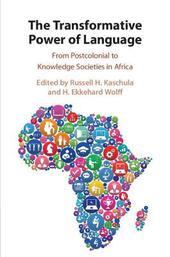
|
The Transformative Power of Language: From Postcolonial to Knowledge Societies in Africa
Paperback / softback
Main Details
| Title |
The Transformative Power of Language: From Postcolonial to Knowledge Societies in Africa
|
| Authors and Contributors |
Edited by Russell H. Kaschula
|
|
Edited by H. Ekkehard Wolff
|
| Physical Properties |
| Format:Paperback / softback | | Pages:394 |
|
| Category/Genre | Sociolinguistics |
|---|
| ISBN/Barcode |
9781108712774
|
| Classifications | Dewey:306.4496 |
|---|
| Audience | | Professional & Vocational | |
|---|
| Illustrations |
Worked examples or Exercises; 31 Tables, black and white; 43 Line drawings, black and white
|
|
Publishing Details |
| Publisher |
Cambridge University Press
|
| Imprint |
Cambridge University Press
|
| NZ Release Date |
31 March 2023 |
| Publication Country |
United Kingdom
|
Description
Language has played a pivotal role in societal transformation in postcolonial Africa towards the creation of globally competitive knowledge societies; however so far, this role has been under-researched and under-estimated. This volume addresses this gap in the literature, by bringing together a team of globally-recognised scholars to explore the effect of language on African postcolonial societies, and how it has contributed to achieving 'mental decolonisation'. A range of languages are explored, both imported (ex-colonial) and indigenous African, and case studies from different spheres of public discourse are investigated, from universities to legal settings. Demonstrating that multilingualism is a resource for, rather than barrier to, successful transformation, this book brings the intellectualisation and institutionalisation of African languages to the forefront of development discourse, and provides an insightful snap-shot of how current academic research, public discourse, political activism and social community engagement have contributed to societal transformation in South Africa.
Author Biography
Russell H. Kaschula is Professor of African Language Studies at Rhodes University. He holds the NRF SARChI Chair in the Intellectualisation of African Languages, Multilingualism and Education. His most recent edited volumes include Multilingualism and Intercultural Communication (2017) and New Frontiers in Forensic Linguistics (2019). In 2019 he was selected as the Mellon Global South Senior Fellow at AUC, Cairo. H. Ekkehard Wolff is Professor and Chair Emeritus of African linguistics, Leipzig University. Recently published works include The Cambridge Handbook of African Linguistics (2019), A History of African Linguistics (2019), and Language and Development in Africa: Perceptions, Ideologies and Challenges (2016).
Reviews'A welcome and important contribution to the study of the role of language in its broader social context. The focus on language as an agent of development and societal change, and particularly the use of local languages in the decolonization of higher education and knowledge creation in Africa, is especially welcome.' Bruce Connell, Professor of Linguistics, York University 'This volume responds to Ngugi wa Thiong'o's call to 'decolonise the mind' in countries of the Global South, particularly in Africa. The authors draw attention to: the necessity of, how to bring, and how to resource multilingual pedagogies in higher education. It is knowledge that resides within African languages that will unsettle coloniality and empower 'southern' scholars to bring about educational transformation in the Global South.' Kathleen Heugh, Associate Professor in Applied Linguistics, University of South Australia '... the book is suitable for different audiences including policy makers, executive managers, student teachers, and educators, especially those working in Higher Education Institutes (HEIs) and those working in South Africa. The language of the book is also accessible and is clear for students at the undergraduate and graduate levels. The book provides an excellent starting point for researchers, students and educators who are interested in themes related to the power of languages in education, inclusion, the importance of education using the first language and those who are interested in the South African context or similar contexts.' Shaden Samir Attia, The LINGUIST List
|